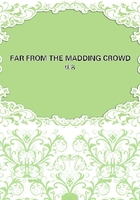
第26章
The Homestead-A Visitor - Half-Confidences
By daylight, the bower of Oak's new-found mistress, Bathsheba Everdene, presented itself as a hoary building, of the early stage of Classic Renaissance as regards its architecture, and of a proportion which told at a glance that, as is so frequently the case, it had once been the manorial hall upon a small estate around it, now altogether effaced as a distinct property, and merged in the vast tract of a non-resident landlord, which comprised several such modest demesnes.
Fluted pilasters, worked from the solid stone, decorated its front, and above the roof the chimneys were panelled or columnar, some coped gables with finials and like features still retaining traces of their Gothic extraction.
Soft brown mosses, like faded velveteen, formed cushions upon the stone tiling, and tufts of the houseleek or sengreen sprouted from the eaves of the low surrounding buildings. A gravel walk leading from the door to the road in front was encrusted at the sides with more moss - here it was a silver-green variety, the nut-brown of the gravel being visible to the width of only a foot or two in the centre. This circumstance, and the generally sleepy air of the whole prospect here, together with the animated and contrasting state of the reverse façade, suggested to the imagination that on the adaptation of the building for farming purposes the vital principle of the house had turned round inside its body to face the other way. Reversals of this kind, strange deformities, tremendous paralyses, are often seen to be inflicted by trade upon edifices - either individual or in the aggregate as streets and towns - which were originally planned for pleasure alone.
Lively voices were heard this morning in the upper rooms, the main staircase to which was of hard oak, the balusters, heavy as bed-posts, being turned and moulded in the quaint fashion of their century, the handrail as stout as a parapet-top, and the stairs themselves continually twisting round like a person trying to look over his shoulder. Going up, the floors above were found to have a very irregular surface, rising to ridges, sinking into valleys; and being just then uncarpeted, the face of the boards was seen to be eaten into innumerable vermiculations. Every window replied by a clang to the opening and shutting of every door, a tremble followed every bustling movement, and a creak accompanied a walker about the house, like a spirit, wherever he went.
In the room from which the conversation proceeded Bathsheba and her servant-companion, Liddy Smallbury, were to be discovered sitting upon the floor, and sorting a complication of papers, books, bottles, and rubbish spread out thereon - remnants from the household stores of the late occupier.
Liddy, the maltster's great-granddaughter, was about Bathsheba's equal in age, and her face was a prominent advertisement of the lighthearted English country girl. The beauty her features might have lacked in form was amply made up for by perfection of hue, which at this winter-time was the softened ruddiness on a surface of high rotundity that we meet with in a Terburg or a Gerard Douw; and, like the presentations of those great colourists, it was a face which kept well back from the boundary between comeliness and the ideal. Though elastic in nature she was less daring than Bathsheba, and occasionally showed some earnestness, which consisted half of genuine feeling, and half of mannerliness superadded by way of duty.
Through a partly-opened door the noise of a scrubbing-brush led up to the charwoman, Maryann Money, a person who for a face had a circular disc, harrowed less by age than by long gazes of perplexity at distant objects.
To think of her was to get good-humoured; to speak of her was to raise the image of a dried Normandy pippin.
`Stop your scrubbing a moment,' said Bathsheba through the door to her.
`I hear something.'
Maryann suspended the brush.
The tramp of a horse was apparent, approaching the front of the building.
The paces slackened, turned in at the wicker, and, what was most unusual, came up the mossy path close to the door. The door was tapped with the end of a crop or stick.
`What impertinence!' said Liddy, in a low voice. `To ride up the foot-path like that! Why didn't he stop at the gate? lord! 'tis a gentleman! I see the top of his hat.'
`Be quiet!' said Bathsheba.
The further expression of Liddy's concern was continued by aspect instead of narrative.
`Why doesn't Mrs Coggan go to the door?' Bathsheba continued.
Rat-tat-tat-tat resounded more decisively from Bathsheba's oak.
`Maryann, you go!' said she, fluttering under the onset of a crowd of romantic possibilities.
`O ma'am - see, here's a mess!'
The argument was unanswerable after a glance at Maryann. `Liddy - you must,' said Bathsheba.
Liddy held up her hands and arms, coated with dust from the rubbish they were sorting, and looked imploringly at her mistress.
`There - Mrs Coggan is going!' said Bathsheba, exhaling her relief in the form of a long breath which had lain in her bosom a minute or more.
The door opened, and a deep voice said--`Is Miss Everdene at home?'
`I'll see, sir,' said Mrs Coggan, and in a minute appeared in the room.